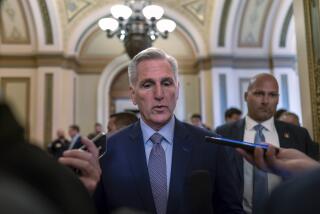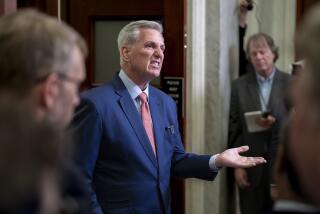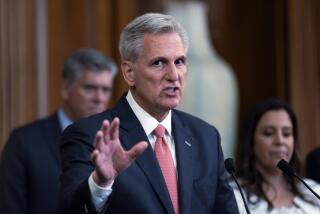Congress hopes to present debt package by Monday
Picking up the pieces after the latest round of debt negotiations imploded, congressional leaders met Saturday with President Obama and began work on a Republican-backed plan to cut spending by roughly $3 trillion over 10 years in exchange for their vote to raise the debt ceiling, according to a leadership aide familiar with the deal.
Although the proposal still faced stiff hurdles with Democrats, House Speaker John A. Boehner — who abruptly broke off talks with the White House on Friday but was present Saturday — told GOP leaders in a conference call that he hoped to report significant progress, if not a deal, within 24 hours, according to a participant.
But as talks continued into the evening, Democratic Senate Majority Leader Harry Reid said he was “deeply disappointed in the status of the negotiations” with Republicans. At issue is whether Republicans will agree to raise the debt ceiling through the end of 2012, as Obama has demanded.
Time is running short. Administration officials say if Congress doesn’t vote to raise the debt ceiling by the Aug. 2 deadline, the U.S. government will not be able to pay its bills, unnerving investors and lenders around the globe.
The meeting at the White House lasted less than an hour and yielded no apparent breakthrough. Congressional aides stressed that heavy lifting had moved to Capitol Hill, where party leaders from both chambers aimed to pull together a package that could be presented to rank-and-file members by Monday.
That time frame could serve to reassure global financial markets and allow just enough time to move a budget reduction bill through both chambers next week — with little room for error.
Republicans emphasized that they are starting from scratch, and are not picking up the Plan B proposal floated earlier this month by Senate Minority Leader Mitch McConnell (R-Ky.) and then altered by Reid (D-Nev.).
“The president wanted to know that there was a plan for preventing national default,” McConnell said in a statement. “The bipartisan leadership in Congress is committed to working on new legislation that will prevent default while substantially reducing Washington spending.”
McConnell’s proposal, which included a plan to authorize the president to raise the limit in stages, was poorly received in the House and mocked by conservative activists as surrendering leverage. But the notion of moving forward in phases had some appeal.
The new House proposal would break the spending cuts into two phases, said the aide, who was not authorized to talk publicly about the negotiations. The proposal would also raise the debt limit in two phases, an idea that Democrats have opposed, the aide said.
Furthermore, the GOP plan did not include new tax revenue, although Democrats intend to keep pushing that key issue in negotiations.
Obama is seeking a $2.4-trillion increase to the limit, enough to cover borrowing through 2012.
Democrats made it clear Saturday that they would not accept a short-term deal. White House Press Secretary Jay Carney said the president expressed his opposition to that approach in the meeting, and had argued that such a deal would affect the U.S. credit rating.
“As the current situation makes clear, it would be irresponsible to put our country and economy at risk again in just a few short months with another battle over raising the debt ceiling,” Carney said in a statement released after the meeting.
In a sign late Saturday that negotiations could be souring, Reid’s statement called on Boehner and McConnell to “reconsider their intransigence. Their unwillingness to compromise is pushing us to the brink of a default on the full faith and credit of the United States.”
House Minority Leader Nancy Pelosi (D-San Francisco) told reporters she “absolutely, positively” would not accept a short-term deal.
“We will not send a message of uncertainty to the world,” Reid said.
Republicans called the president’s position a political maneuver.
“Now, we do not know what size or shape a final package will take, but it would be terribly unfortunate if the president was willing to veto a debt limit increase simply because its timing would not be ideal for his reelection campaign,” said Boehner spokesman Michael Steel.
kathleen.hennessey@latimes.com
More to Read
Start your day right
Sign up for Essential California for news, features and recommendations from the L.A. Times and beyond in your inbox six days a week.
You may occasionally receive promotional content from the Los Angeles Times.







